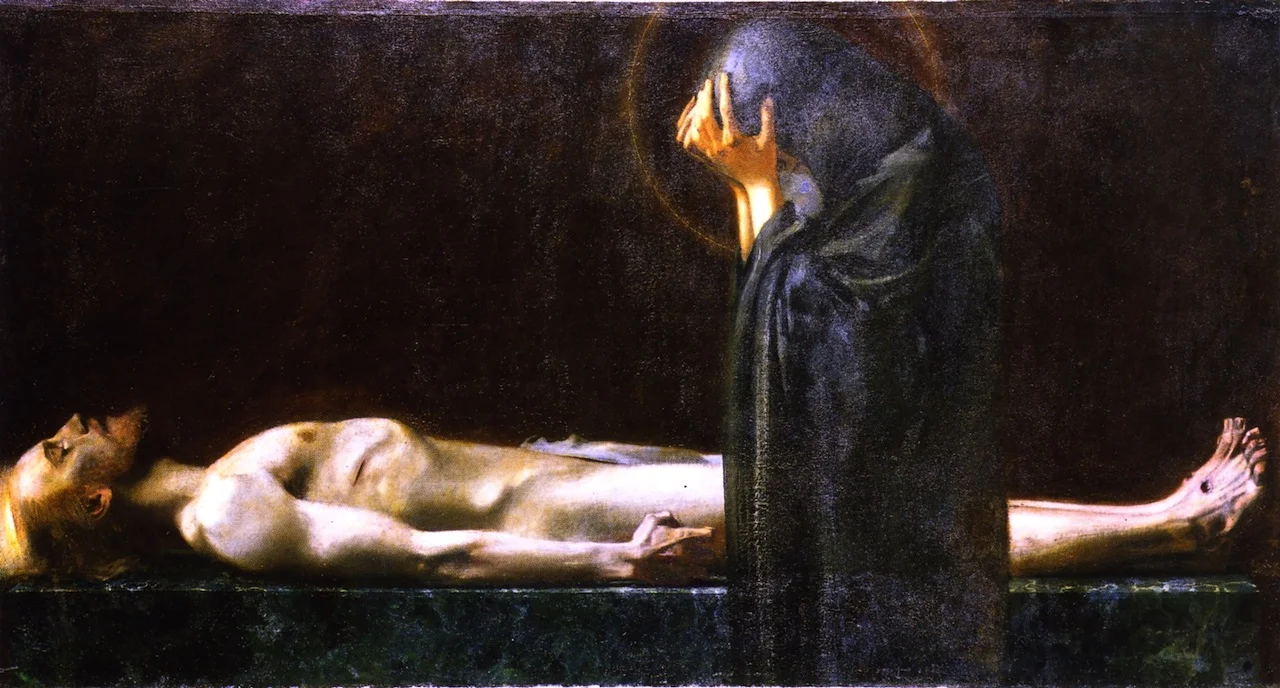Oil and Silver
Magdalen College, where I’m doing my doctorate, is home to one of the oldest surviving copies of any Gospel text. Inked onto a few scraps of papyrus are snatches of two stories from Matthew 26. In one, a woman empties out an expensive bottle of luxury perfume to anoint Jesus before his death. In another, Jesus’ follower Judas makes a deal to have him killed in exchange for a little cash from the temple authorities.
There’s a kind of providence to the fact that these two stories are among the oldest ones preserved, and that they’re preserved together. They seem to me like inverse images of one another, still-frame pictures of the double-sided human heart that Palm Sunday called to mind. Both Matthew and Mark put the two one after another: the lavish adoration and the cold betrayal.
I recognise in those two pictures two reactions that I have to God almost every day, sometimes together in a single instant. One reaction is to see excellence and long, with a yearning so primal it’s frankly embarrassing, to contribute to it whatever gifts I have. The other is to encounter love and think, ‘what can I get out of that?’
No one knows why Judas did what he did — people think maybe he was angry that Jesus had disappointed his aspirations to political revolution. Or maybe he just wanted the money. But whatever it was, there must have come a point when he looked at the man who had offered to usher him into God's kingdom and thought, ‘what are you worth to me?’
But that woman with her perfume knew: God is worth nothing other than himself. That is, you don’t trade him in for money, or pray to him for a big house like some kind of Holy Vending Machine. You answer his invitation to dinner and you go and you sit with him. He is, as I wrote a couple days ago, a person with wants and preferences and interests, and what he wants is you. What he’s interested in is you. He’s given up fame and influence and riches because he prefers to have you around. And your heart, for all that it’s itching to sell him downriver in exchange for those other things, is also longing — in some private wellspring of neglected sincerity — to have him around too.
So you go to dinner, or to mass, or you pray on your morning run, and you are you without censorship. You talk to God, or your friend, who is God’s image. You pour out your broken self with your thwarted hopes and your sorrow at all the times you didn’t measure up, pour them out like costly oil on the head of a dying man. At least, you do on the good days.
Other days you keep all that hidden and avoid looking truth in the eye; you try to manipulate God and his children to get what you want because that’s easier than letting them see who you are.
But there comes a time — two days from now, in fact — when the God into whom you sometimes managed to pour your faltering self pours his own abundant self back out onto you. And then you will find, miraculously, that he has cast aside your innumerable small betrayals and made of your pitiful gifts a new heaven and a new earth, and wherever his Gospel is spoken your life also is remembered and renewed. Because he took whatever you brought him, knowing full well that you weren’t good enough, that you were not who you longed to be and could not give him the love he wanted from you. And in exchange he gave you himself.
-- -- --
I’ve noticed that the women in Jesus’ life were particularly good at understanding this — at pouring themselves forth in his presence. Mary Magdalene and the sisters of Bethany poured forth their oil on his head, their anxieties at his side, their tears at his feet and his grave. And he in turn promised to pour himself forth, like a grain of wheat that falls and dies, to bear the fruit of a new world.
All of this calls to my mind another famous woman, Wisdom, who pours herself forth in the creation of the world and has sometimes been identified with Jesus, or some person of the triune God that Jesus is. Here’s my translation of the mysterious passage from Proverbs 8 that I have in mind.
Proverbs 8:22-31
(Wisdom speaks):
God set me at his trailhead, the place before everything he did in time.
I cascaded forth from forever, from the beginning, from the place before the Earth.
In the nothing without depths, I danced.
In the nothing without wellsprings that flow heavy with water.
When the mountains hadn’t settled yet,
Ahead of the hills,
I danced.
When he still hadn’t made Earth, or fields, or the beginning of the dust of the world,
When he laid the foundations of the heavens, there I was.
When he laid a boundary encircling the face of the deep,
When he condensed the clouds from above,
When he built up wellsprings from the deep,
When he laid down his boundary for the sea, and the waters never went past where he said,
When he laid down the groundwork of the Earth,
Then I was at his side, taken care of.
Then I was delight day by day, rejoicing in his sight at every moment.
Cherishing the world of his Earth in glee — my delights are in the human sons of the soil.
